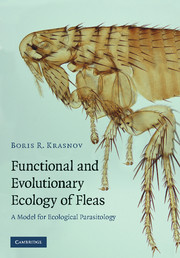Book contents
- Frontmatter
- Contents
- Preface
- Part I Brief descriptive ecology: what do fleas do?
- Part II Functional ecology: how do fleas do what they do?
- 7 Ecology of sexual dimorphism, gender differences and sex ratio
- 8 Ecology of flea locomotion
- 9 Ecology of host selection
- 10 Ecology of haematophagy
- 11 Ecology of reproduction and pre-imaginal development
- 12 Ecology of flea virulence
- 13 Ecology of host defence
- Part III Evolutionary ecology: why do fleas do what they do?
- References
- Index
12 - Ecology of flea virulence
Published online by Cambridge University Press: 14 August 2009
- Frontmatter
- Contents
- Preface
- Part I Brief descriptive ecology: what do fleas do?
- Part II Functional ecology: how do fleas do what they do?
- 7 Ecology of sexual dimorphism, gender differences and sex ratio
- 8 Ecology of flea locomotion
- 9 Ecology of host selection
- 10 Ecology of haematophagy
- 11 Ecology of reproduction and pre-imaginal development
- 12 Ecology of flea virulence
- 13 Ecology of host defence
- Part III Evolutionary ecology: why do fleas do what they do?
- References
- Index
Summary
A parasite is commonly defined as an organism that lives in or on host and from which it derives food and other biological supplies (Kim, 1985b). In addition, it reduces host fitness (Watt et al., 1995; Clayton & Moore, 1997), including causing an increase of host mortality and/or morbidity (Shaw & Moss, 1990; Delahay et al., 1995). A concept of harm or any other negative effect on a host is an integral part of the ecology of parasitism. Consequently, one of the main asymmetries in host–parasite relationships is that fitness of a host without a parasite is maximal ceteris paribus, whereas fitness of a parasite without a host is zero (Combes, 2001; Poulin, 2007a). Another asymmetry is that the fitness of a host is determined by a variety of extrinsic and intrinsic factors, but fitness of an infested host is also affected by competition with the parasite, which may use part of the resources that a host would otherwise allocate for an increase in its own fitness (Combes, 2001; Poulin, 2007a). Thus, a parasite may reduce fitness in a host. The component of loss of fitness resulting from a parasite, i.e. parasite-induced loss of fitness, is virulence (Combes, 2001). Virulence is a parameter characterizing the parasite, but it can be measured via host fitness or its elements (Combes, 2001).
- Type
- Chapter
- Information
- Functional and Evolutionary Ecology of FleasA Model for Ecological Parasitology, pp. 217 - 238Publisher: Cambridge University PressPrint publication year: 2008



